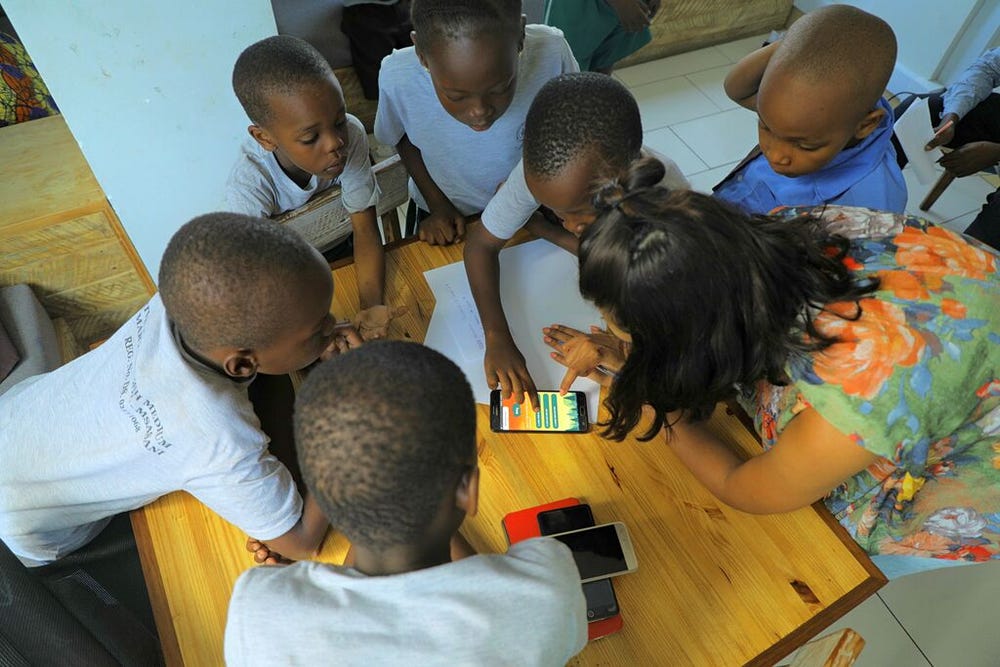A fair start in life
From Nairobi’s largest slums to construction camps in Chiang Mai and Delhi, and from Central Harlem to rural South Africa, meet six organisations that take early childhood opportunities to access quality learning very seriously. Here’s why Cartier Philanthropy finds it so important to support them.
© Cartier Philanthropy / Karin Schermbrucker
Research shows that sustained access to high-quality early childhood care and education programmes has long-lasting benefits, preparing children for formal schooling, foundational learning and lifelong well-being, while also making it easier for their parents to work.
Experts refer to the learning and development gains that come from quality early learning experiences as the “school entry boost.” This boost has been shown to halve the skills gap between children from under-resourced backgrounds and their more resourced peers.
“Early childhood care and education provision is one of the most transformative investments we can make to give children a fair start in life,” says Cassandre Pignon, Cartier Philanthropy’s Head of Programmes.
Today, the foundation’s portfolio includes six non-profit organisations that provide early childhood development programmes in under-resourced communities around the world. From Nairobi’s largest slums to construction camps in Chiang Mai and Delhi, and from Central Harlem to rural South Africa, innovative organisations like the Baan Dek Foundation, Harlem Children’s Zone, Kidogo, Mobile Creches, SmartStart and Ubongo are working hard to increase access to early childhood quality learning opportunities, whether in the home or in care and education centres.
We asked Cassandre why Cartier Philanthropy invests in early childhood development and what the foundation looks for in partner organisations working in this field.
“Learning begins at birth. If we want education systems that are relevant and fair for all, that support every child to reach their potential regardless of the circumstances in which they are born, then we need to ensure the youngest children are included.
“Enrolment in primary school is, of course, crucial, but a lack of early stimulation or nurturing care undermines a child’s development and can adversely impact their learning journey. Yet many children simply don't have access to programmes that prepare them to succeed in school and life. Children from vulnerable communities often don’t understand the language spoken in their primary school, have rarely seen a book when they get there and may not have developed the fine motor skills necessary to learn to write. All this creates inequalities in grade one which often persist throughout their lives. We want to change that.”
“Early childhood care and education provision is one of the most transformative investments we can make to give children a fair start in life."

© Cartier Philanthropy / Karin Schermbrucker
MEETING ALL CHILDREN’S BASIC NEEDS
On June 2024, UNESCO and UNICEF jointly published the first Global Report on Early Childhood Care and Education. This report provides valuable insights into global and regional trends, and highlights the gaps that still exist in policy and investment. It also draws attention to key factors in early learning experiences. For example, it points out that children are influenced significantly by their immediate environment (home, family and neighbourhood), their access to and the quality of pre-primary education (or the lack of it) and the opportunities they have to develop social-emotional skills through play or play-based learning.
“The partner organisations we support focus on precisely these crucial factors,” Cassandre points out. “Baan Dek Foundation in Thailand and Mobile Creches in India both work to meet the early childhood care and development needs of the children of workers living on construction sites and in urban slums. These children usually don’t have access to sufficient nutritious food and learning opportunities. Most of the time, they’re simply invisible.”
The Tchin Tcho Nursery in Chiang Mai, established and run by the Baan Dek Foundation, provides infants and toddlers aged 18 months to four years with the stimulating, safe and secure environment they need to develop their cognitive, social and emotional skills.
Mobile Creches sets up and runs quality day care centres across 15 states in India, or assists other local non-profit organisations and construction development companies to do so, with the same purpose of providing marginalised children with the care and protection they need during their most foundational years.

© Cartier Philanthropy / Ben Buckland

© Mobile Creches
CREATING SCALABLE MODELS FOR QUALITY CHILDCARE
“Other organisations, like Kidogo in Kenya and SmartStart in South Africa, are working to professionalise and grow the number of existing informal childcare centres,” continues Cassandre. “Little or no pedagogical training is provided for caregivers in many parts of the world, impacting the quality of pre-school education. Kidogo and SmartStart are filling this gap by identifying, training and supporting childcare workers, often women, to become early childhood development practitioners running their own centres.
“Cartier Philanthropy is focused on programme outcomes such as pre-numeracy, pre-literacy, social-emotional learning and executive function, together with nutritional outcomes where relevant. But we’re also particularly interested in centre-based programmes because they have the added benefit of freeing up time for the children’s parents – especially their mothers – to engage in economic activities. This is important both for women’s empowerment and for alleviating poverty in their families”.

© Cartier Philanthropy / Karin Schermbrucker

© SmartStart / Nic Bothma
THE INFLUENCE OF NEIGHBOURHOODS AND COMMUNITIES
Neighbourhoods and communities form the next level of influence on children’s learning and development, after the home environment and childcare and pre-school services.
Harlem Children’s Zone in Central Harlem, New York, provides services and support for everyone in the Central Harlem community – from expectant parents, children of all ages and young professionals all the way to senior citizens.
This “neighbourhood approach” achieves three goals: It reaches enough children to influence the community’s culture. It transforms the physical and social environments that affect children’s development. And it creates programmes at a scale that meets the community’s needs.
“Neighbourhoods and communities have significant potential to provide learning spaces for children. The lack of green spaces in cities deprives young children of opportunities for exploration, which impacts their physical and cognitive development. Integrating early childcare and education in existing health and social services, where the community already plays a key role, can also be more acceptable to community members. That’s the case with Harlem Children’s Zone,” adds Cassandre.

© Harlem Childrens Zone
EDTECH AND EDUTAINMENT AS EFFECTIVE COMPLEMENTS
While not a replacement for centre-based learning, EdTech and Edutainment can be valuable complements. EdTech – short for educational technology – is changing the way children learn, making it more engaging, personalised and accessible. Edutainment – the combination of education and entertainment – has simultaneously gained traction to make learning fun and interactive, which improves knowledge retention.
Ubongo creates fun, localised edutainment cartoons that entertain children while helping to improve their school readiness and learning outcomes. Millions of families across 41 African countries benefit from Ubongo’s free Edutainment programmes, which can be accessed on TV, radio and mobile phones.
“Edutainment can help children develop critical cognitive skills through games, stories and interactive activities. Featuring characters that children can relate to, Ubongo’s programmes also help children develop certain essential social and emotional skills, including empathy, self-awareness and relationship building,” says Cassandre. “These programmes are extremely cheap and relatively easy to deploy for a large audience, which makes them an attractive complement to centre-based programmes.”
One of Ubongo’s animated series is Akili and me, in which Akili enters Lala Land every night as she falls asleep and then learns things with her animal friends. “In Tanzania, children who watched Akili and me regularly for 12 weeks showed a 27% increase in shape recognition and a 24% increase in counting skills. Regular viewers were also more successful at naming emotions.”
While its importance is becoming increasingly clear, the field of early childhood education is still nascent.
“Education research for pre-schoolers is more complex than for older children, partly because there are no agreed standardised tests for early childhood competencies. So there are extraordinary learning opportunities for researchers, philanthropists and policymakers seeking to design and build effective, affordable solutions for all children”.

© Ubongo
